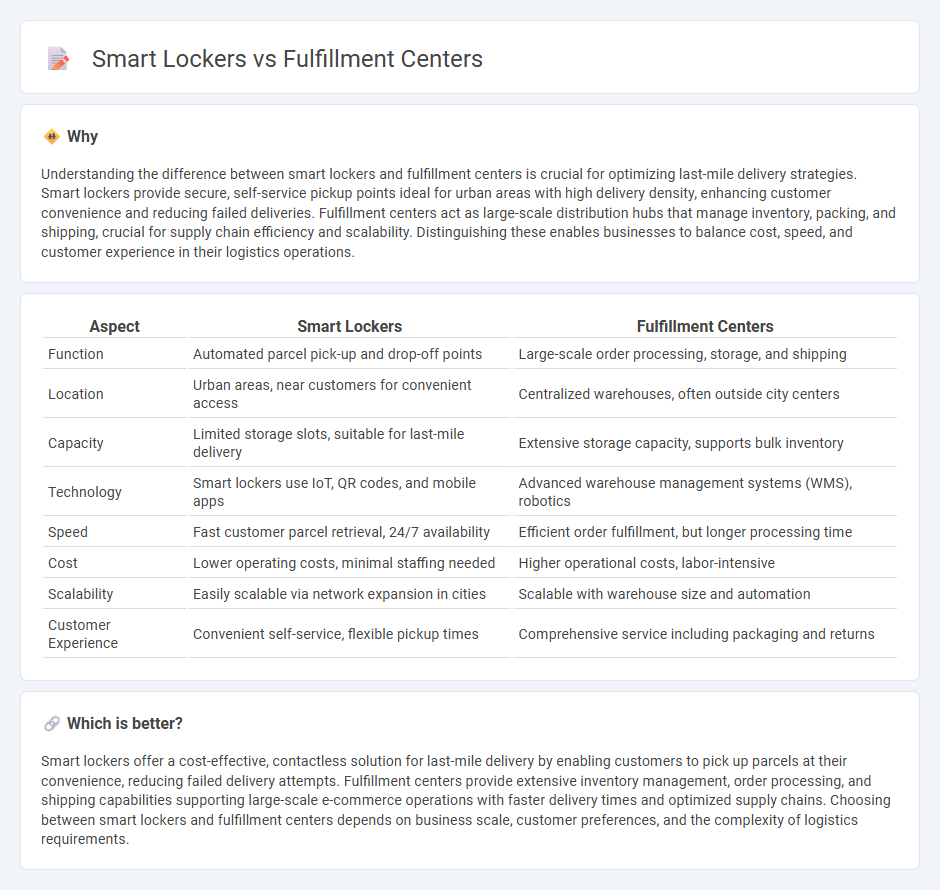
Smart lockers offer a decentralized, automated solution for last-mile delivery, reducing shipping times and lowering labor costs compared to traditional fulfillment centers. Fulfillment centers, with their large-scale inventory management and bulk order processing capabilities, remain essential for handling extensive product assortments and high-volume shipments. Explore how integrating smart lockers and fulfillment centers can optimize modern logistics strategies.
Why it is important
Understanding the difference between smart lockers and fulfillment centers is crucial for optimizing last-mile delivery strategies. Smart lockers provide secure, self-service pickup points ideal for urban areas with high delivery density, enhancing customer convenience and reducing failed deliveries. Fulfillment centers act as large-scale distribution hubs that manage inventory, packing, and shipping, crucial for supply chain efficiency and scalability. Distinguishing these enables businesses to balance cost, speed, and customer experience in their logistics operations.
Comparison Table
| Aspect | Smart Lockers | Fulfillment Centers |
|---|---|---|
| Function | Automated parcel pick-up and drop-off points | Large-scale order processing, storage, and shipping |
| Location | Urban areas, near customers for convenient access | Centralized warehouses, often outside city centers |
| Capacity | Limited storage slots, suitable for last-mile delivery | Extensive storage capacity, supports bulk inventory |
| Technology | Smart lockers use IoT, QR codes, and mobile apps | Advanced warehouse management systems (WMS), robotics |
| Speed | Fast customer parcel retrieval, 24/7 availability | Efficient order fulfillment, but longer processing time |
| Cost | Lower operating costs, minimal staffing needed | Higher operational costs, labor-intensive |
| Scalability | Easily scalable via network expansion in cities | Scalable with warehouse size and automation |
| Customer Experience | Convenient self-service, flexible pickup times | Comprehensive service including packaging and returns |
Which is better?
Smart lockers offer a cost-effective, contactless solution for last-mile delivery by enabling customers to pick up parcels at their convenience, reducing failed delivery attempts. Fulfillment centers provide extensive inventory management, order processing, and shipping capabilities supporting large-scale e-commerce operations with faster delivery times and optimized supply chains. Choosing between smart lockers and fulfillment centers depends on business scale, customer preferences, and the complexity of logistics requirements.
Connection
Smart lockers enhance fulfillment centers by providing secure, automated pickup points that streamline last-mile delivery processes. Fulfillment centers integrate with smart locker networks to reduce delivery times, lower shipping costs, and improve customer convenience through contactless parcel retrieval. This synergy optimizes supply chain efficiency and supports scalable e-commerce logistics solutions.
Key Terms
Order Processing
Fulfillment centers optimize order processing through centralized inventory management and advanced automation technologies, enabling faster picking, packing, and shipping workflows. Smart lockers streamline last-mile delivery by offering secure, self-service pickup points that reduce delivery time and enhance customer convenience. Explore how combining these solutions can elevate your order processing efficiency and customer satisfaction.
Last-Mile Delivery
Fulfillment centers streamline last-mile delivery by centralizing inventory management and enabling rapid order processing to meet customer demands efficiently. Smart lockers offer a convenient, secure pickup option that reduces delivery failures and operational costs by minimizing direct delivery attempts. Explore how integrating both solutions can optimize your last-mile delivery strategy for enhanced customer satisfaction.
Inventory Management
Fulfillment centers utilize advanced inventory management systems to handle large volumes of stock, ensuring efficient order processing and real-time inventory tracking. Smart lockers offer decentralized storage solutions, enabling quick and contactless customer pick-ups while maintaining accurate inventory updates through IoT-enabled technology. Explore the comparative benefits of these solutions to optimize your supply chain operations.
Source and External Links
Fulfillment Center & Warehousing Services: Tips and Tactics - A fulfillment center is a large facility, often operated by a third-party logistics (3PL) provider, that manages inventory, picks, packs, and ships customer orders on behalf of sellers, supporting both direct-to-consumer and business-to-retail fulfillment while streamlining the entire order fulfillment process.
A-Z Guide to Fulfillment Centers | Function & Benefits - Fulfillment centers actively handle inventory storage, order processing, packing, and shipping to fulfill customer orders efficiently and are distinct from warehouses by their operational focus on order fulfillment rather than just storage, with examples including Amazon Fulfillment Centers and third-party providers like ShipBob.
Fulfillment house - The terms fulfillment center and fulfillment house originated in the 1990s to describe packing warehouses that perform warehousing, picking, packaging, and shipping services, either operated in-house or outsourced, with companies like Amazon running their own fulfillment centers as well as offering services to third-party sellers.
 dowidth.com
dowidth.com